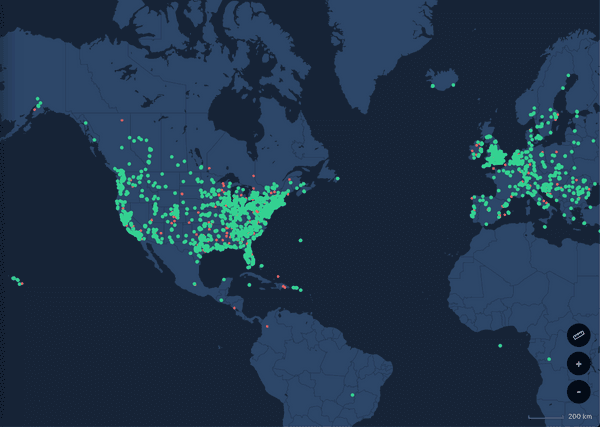Will Helium finally make IoT a reality?
Curated from: preethikasireddy.com
Ideas, facts & insights covering these topics:
10 ideas
·338 reads
1
Explore the World's Best Ideas
Join today and uncover 100+ curated journeys from 50+ topics. Unlock access to our mobile app with extensive features.
1) Sensationalism in journalism.
Part of the problem stems from hype and sensationalism in tech journalism. Journalists are storytellers, not technology experts. While they did their job of writing stories that drove people’s imagination wild, their narratives were a bit overexaggerated.
6
60 reads
2) Security.
2) Security. All it takes is one point of entry to be compromised for the entire IoT network to be hacked. This means the engineering of these smart devices has to be pristine, and that takes time.
6
43 reads
3) Privacy.
3) Privacy. We are all well aware of the privacy concerns of devices that track us 24/7. There are ethical concerns of whether the excessive amount of tracking that IoT would enable is a good thing or not.
6
36 reads
4) Closed ecosystems.
4) Closed ecosystems. Many of the largest IoT players are large enterprises (e.g. Cisco, GE, Microsoft), and they all operate in closed ecosystems. There are no shared protocols defined for how devices connect both to each other and to a central hub. Consider: if a consumer buys two Google smart devices, three GE smart devices, and two Apple smart devices, without shared standards, these devices cannot communicate with each other.
6
28 reads
5) Bad incentives.
5) Bad incentives. Consumers haven’t shown much interest in upgrading to smart devices because, frankly, the benefits do not outweigh the costs (i.e. low ROI). Enterprises have not made the effort to distribute and deploy these devices in the real world (high costs, unclear ROI).
5
31 reads
Helium is a decentralized IoT network. The network consists of “hotspots” (devices) that are maintained by “miners” all around the world. These miners earn incentives for maintaining this network of hotspots, and the hotspots communicate and coordinate to provide data services for end users.
The network is designed to be decentralized, the rules for orchestration and data services are hard-coded into smart contracts that live on Helium’s blockchain.
Helium's algorithm,“Proof-of-Coverage”, incentivizes the creation of this physically decentralized wireless IoT network.
6
27 reads
At any point in time, a hotspot can play three different roles:
- Challenger: The hotspot that constructs and issues a “challenge.” Hotspots issue challenges approximately once per every 240 blocks.
- Challengee: This hotspot is the target of the challenge. When it receives a challenge, it transmits the challenge response packets that nearby hotspots can listen to.
- Witness: These are hotspots that are geographically close to the challengee and are responsible for “witnessing” the packets that the challengee is transmitting in response to the challenger.
6
30 reads
cases for which Helium is being used today
1) Water Tracking - ReadyRefresh by Nestlé is a customizable beverage delivery service, and was one of the first customers to test the Helium network for water tracking in Connecticut.
2) Agricultural Monitoring - Agulus is an agtech company and uses Helium’s network to automate water distribution based on wireless sensors connecting to the Helium hotspots.
3) Micro-mobility tracking : Lime (the scooter company) uses the Helium network to find lost bikes and scooters.
6
35 reads
4) Building & Asset Monitoring : Conserv offers wireless monitoring for art collections in private and public museums and uses Helium to provide information about artwork.
5) Health Monitoring : Careband offers consumers wireless wristbands to monitor the location and temperature of people working in hospital or office environments to help track contacts related to COVID-19. Careband uses Helium to track the locations of wristbands.
6) IoT Innovation : To minimize friction, Salesforce is using Helium to build an IoT program to allow employees access to these resources using their badges.
6
22 reads
IDEAS CURATED BY
CURATOR'S NOTE
We might have some sunshine in the IoT sector with the upcoming decentralised companies or even DAOs.
“
Decebal Dobrica's ideas are part of this journey:
Learn more about crypto with this collection
The importance of networking in podcasting
How to grow your podcast audience
How to monetize your podcast
Related collections
Similar ideas
6 ideas
How Does Blockchain Security Work, Anyway?
hackernoon.com
5 ideas
6 ideas
Web 3.0 Is Coming, and Here's What That Really Means for You
entrepreneur.com
Read & Learn
20x Faster
without
deepstash
with
deepstash
with
deepstash
Personalized microlearning
—
100+ Learning Journeys
—
Access to 200,000+ ideas
—
Access to the mobile app
—
Unlimited idea saving
—
—
Unlimited history
—
—
Unlimited listening to ideas
—
—
Downloading & offline access
—
—
Supercharge your mind with one idea per day
Enter your email and spend 1 minute every day to learn something new.
I agree to receive email updates
